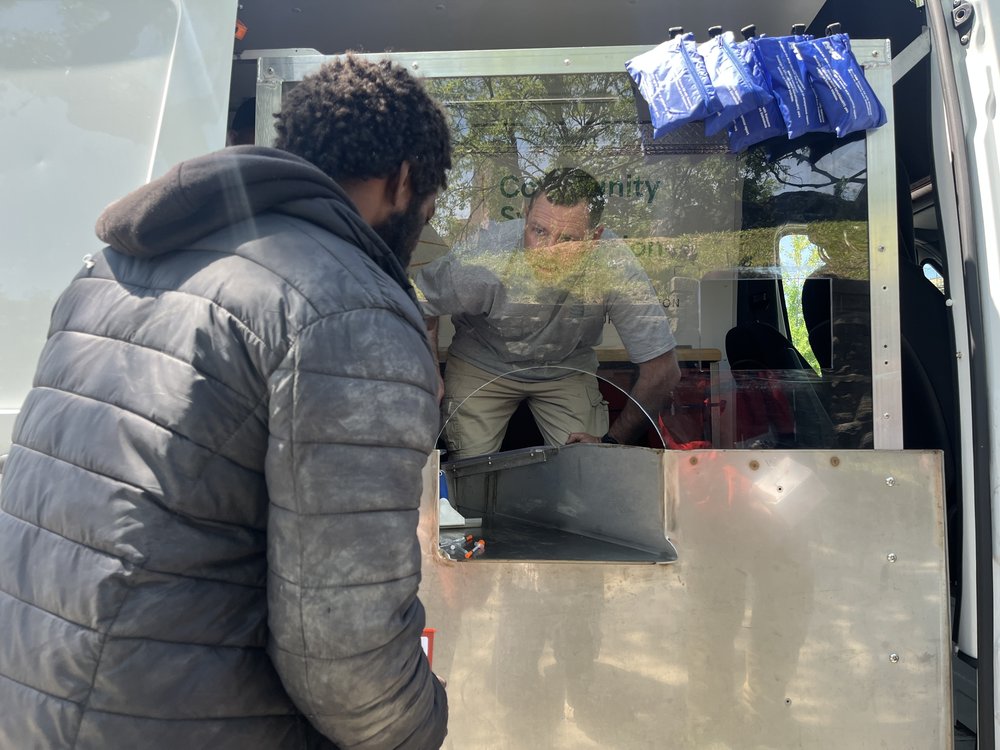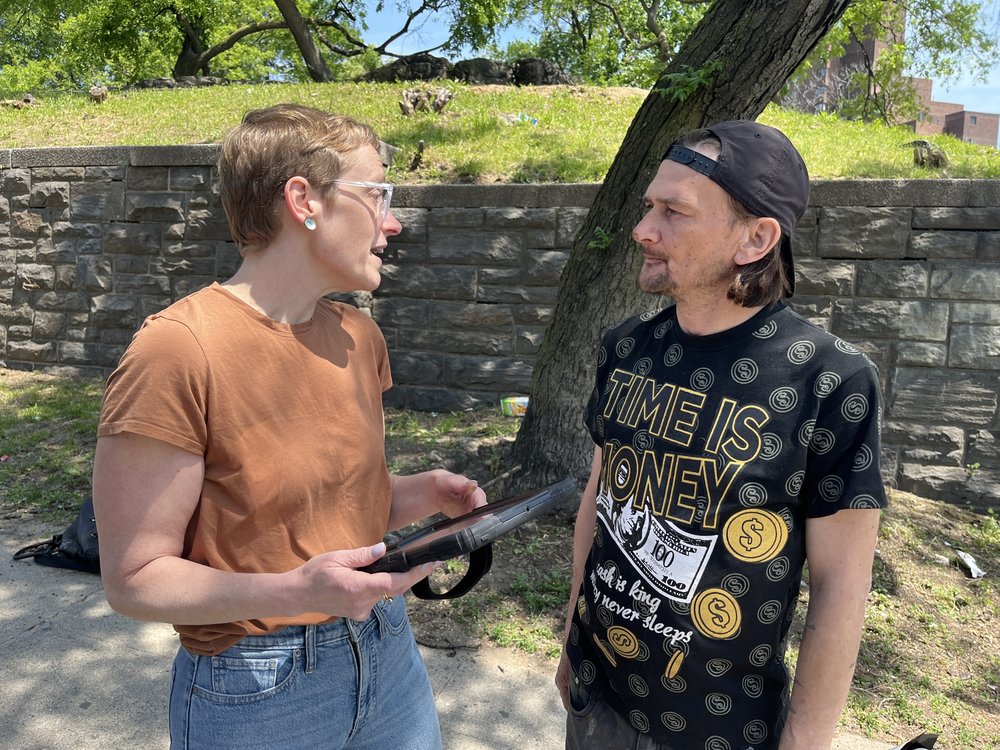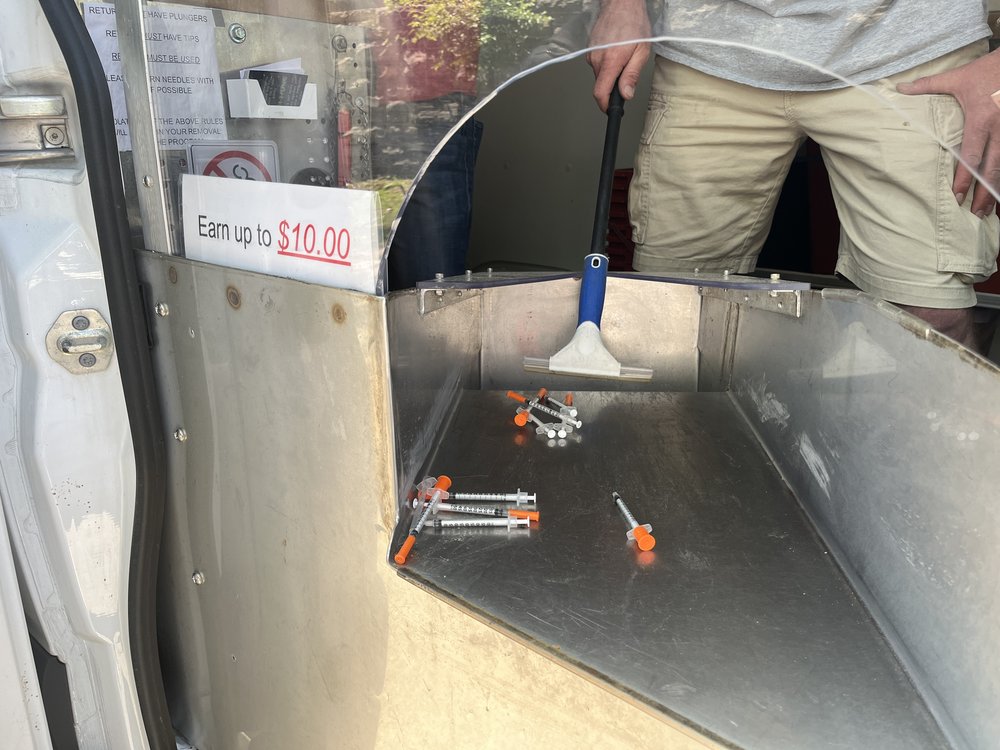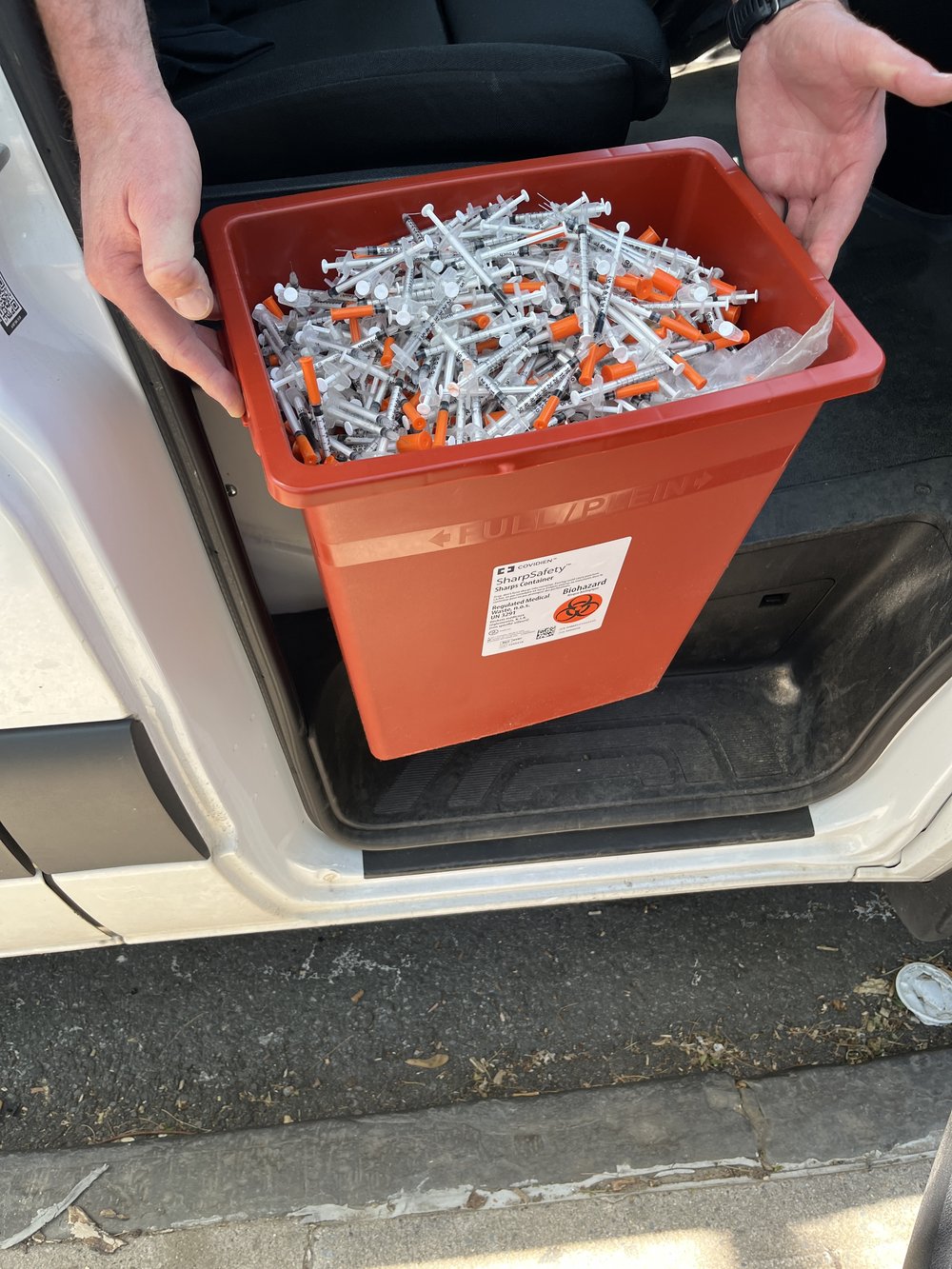A NYC program trades cash for used needles. It’s paying out thousands of dollars.
May 14, 2025, 8 a.m.
New Yorkers made 795 complaints to 311 about needles on the ground in 2024, according to city data.

A white van pulled up outside the Bronx’s Echo Park around lunchtime and a line of people began to form. They were there to turn in used syringes — either their own or ones they found on the ground — for 20 cents each.
In this area, used needles are easy to come by. Zyre Howard, who’s staying at a nearby homeless shelter, turned in 55 during a “buy back” Monday and got $10, the maximum amount one can earn per day at one of the locations where the van stops.
“It’s awesome,” Howard said of the city’s recently launched Community Syringe Redemption Program. “It's a way for people to make money and we’re cleaning up the streets. So that's a win-win.”

The pilot program, which started in late March, is the city’s latest attempt to get hazardous needles off the street in areas where public drug use is common. It’s starting mostly with Bronx hotspots like The Hub, as well as Highbridge Park in Upper Manhattan and the intersection of 143rd Street and Archer Avenue in Queens.
The City Council passed a law in 2022 mandating the creation of the pilot program amid rising concerns about syringe litter.
The pilot is run by Addiction Response Resources, a nonprofit that launched a similar program in Boston in 2020, which the group said was the first of its kind. The program is supposed to be evaluated after a year but the city already inked an $11 million contract with Addiction Response Resources that runs through 2027.
New Yorkers must be over 18 years old and receive safety training to participate. Many of those who sign up use injection drugs, and can also get free kits with the overdose reversal drug naloxone as well as referrals to other services, said Allie Hunter, a cofounder of Addiction Response Resources.

Echo Park is one of eight sites that Hunter's crew visits around the city. In the hour or so that they spent parked outside the park on Monday, the crew managed to fill a bucket – which holds about 2,500 syringes.
“We worked really closely with the city to select the locations and to make sure they were placed in areas where there was a need,” Hunter said.
Complaints about syringes to 311 have risen every year since the city began tracking them five years ago, according to city data. New Yorkers made 795 complaints to 311 about needles on the ground in 2024, 12% more than the previous year.
City sanitation workers and some nonprofits that serve drug users also clean up drug paraphernalia. The sanitation department removed more than 80,000 needles from city streets last fiscal year, and more than 90,000 the year before that, according to the latest Mayor’s Management Report. Echo Park and several other Bronx parks also have special syringe disposal boxes that were installed under former Mayor Bill de Blasio.

But for New Yorkers who live near the pockets of the city where people frequently inject drugs in the open, including certain parks in the Bronx, syringe litter can feel like an intractable problem. The needles serve as a visible sign of drug use and kids could get hurt if they accidentally get stuck by one. Used syringes can also carry diseases, although a city health department fact sheet says there have been no known cases in the United States of someone contracting HIV after getting pricked by a discarded syringe and only very rare cases of hepatitis transmission.
On Monday, a path leading into Echo Park was strewn with the bright orange caps that go on the tips of syringes, although there weren’t any needles visible at first glance.
Inside the park, about a dozen people sat on the steps of a small amphitheater. Some helped each other inject drugs, while workers with the nonprofit VIP Community Services, a drug treatment and harm reduction provider, performed outreach.
Jessica De La Cruz, 34, who lives about a 10-minute walk from Echo Park, said she avoids parks in her borough altogether, and takes her 2-year-old daughter to play in Central Park instead.
“She's a nature baby. She likes the dirt, she likes trees,” De La Cruz said. “I wouldn’t bring her around here.”
De La Cruz said she appreciates city efforts to clean up syringe litter, including the program run by Addiction Response Resources, but said she didn’t think the cash incentive was necessary.
City programs that work with drug users without pushing treatment — such as those that hand out clean syringes — are sometimes met with the criticism that they are enabling people to use drugs. At once, needle exchanges have been around since the 1980s and have been credited with helping New York City drastically reduce the spread of HIV.
Keith Garcia, who passed by the buyback truck Monday, said he is on methadone, a treatment for opioid addiction. He at first assumed the truck was handing out syringes and said he opposed it.
When he found out the truck was collecting needles, rather than giving them out, he changed his tune — and signed up to participate.
Rebecca Linn-Walton, assistant commissioner of the Bureau of Alcohol, Drug Prevention and Treatment at the city health department, said she believes the syringe buyback program is “going to really help with beautiful, vibrant public spaces for people to access,” while also connecting drug users with the services they need.
The city has a full list of locations for the pilot program and additional information on syringe safety on its website.
Correction: This story has been updated to correct the spelling of Rebecca Linn-Walton's name and title.
Could a syringe buyback program help clean up New York City streets? Preventable infections linked to $1 billion in hospitalizations among NJ drug users Overdose prevention centers save lives but remain in legal limbo, as NYC moves toward expansion Harlem residents demand cleanup of drug refuse in Central Park's North Woods